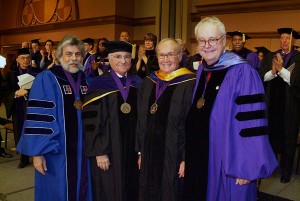As the 119 new lawyers who graduated from The John Marshall Law School on Jan. 16 look forward to their years in the legal profession, commencement speaker Newton N. Minow told
them one of the first things they will need to learn is that their clients are not always 100 percent correct. “And it will be your challenge to prove to him (the client) that he may not be (correct),” Minow said.
“I take my text from a New Yorker cartoon in which the jury came in. The judge asked: ‘Mr. Foreman, have you reached a verdict?’ The foreman said, ‘Yes, your honor. We find the defendant not guilty, but not so innocent either.’
“I take that text because that’s what you will often see in the active day-to-day practice of law. Most legal matters and disputes are not all one way or the other…If your client was always
right, we really wouldn’t need lawyers. If people were rational, fair, objective, thoughtful, and reasonable, they could solve their problems themselves,” he told the graduates.
“What I’ve learned is that often the toughest assignment a lawyer has is to persuade a client to see things from a different perspective. Your own client needs to be informed, persuaded, sometimes cajoled, to have his or her mind opened to the arguments of the other side.”
Minow said the graduates, as new lawyers, will learn much that wasn’t taught in law school “out on the firing line.” “You find that in very, very few cases will your client always be completely right and, in many, many cases, it is up to you to set the client right,” Minow reminded them.
“Some of the lessons I learned are not about the law—but about living a good life. Here are five lessons I have learned:
“1) Don’t confuse the urgent with the important. Many people spend their lives tending to the urgent—and neglect the important in their lives. Your family is always the most important.
“2) Do some public service.
“3) Remember that yours is a noble profession. You can save lives, protect the innocent, convict the guilty, provide good advice, and serve justice.
“4) I learned in a semantics course in college always to ask two questions: 1) What do you mean? 2) How do you know? Most arguments persist through failure to ask and answer
these two questions.
“5) Each of us is three selves: who you are, who you want to be, and who you want people to think you are. If you keep these three selves together, you are a healthy human being—but
if these three selves are not in balance, there is trouble ahead.” He has found that “the best part of being a lawyer is being able to keep learning every day.”
And he reminded them to “remember that the practice of law is an art, not a science.”

Newton N. Minow (third from left), senior counsel at Sidley Austin LLP, is congratulated by (from left) Associate Dean Ralph Ruebner; Leonard Amari, president of The John Marshall Law School Board of Trustees; and Dean John Corkery, after receiving an honorary degree during the law school’s 190th commencement on Jan. 16. Minow also delivered the commencement address.
